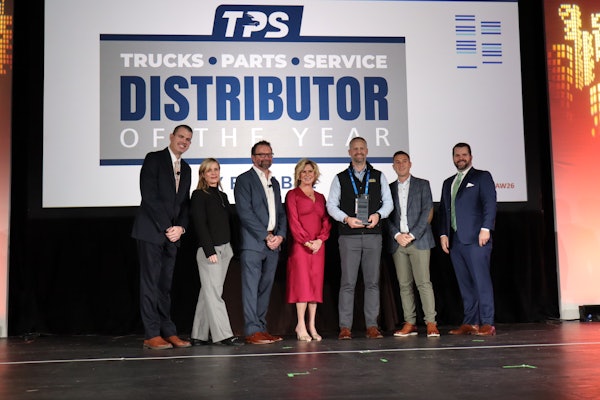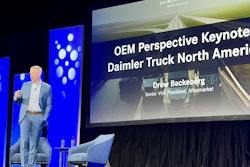It is said in life there are but two certainties: Death and taxes. Neither is pleasant to think about, but both become more palatable when appropriately planned for.
When it comes to your business, death and taxes are also realities, but succession planning can help ensure your company survives in your absence and is run by those whom you want running it.
After all, it’s your life’s work and you want it to succeed, whether you have family waiting in the wings to carry the torch, internal management you want to have takeover or plan to sell to a third party. Succession planning helps make the transition smooth, bring maximum value to both seller and buyer and bring peace of mind to employees.
Despite the benefits, distributorships and repair facilities with formal succession plans in place are more the exception than the rule.
“Is the aftermarket doing a good job in making succession plans? My feeling is they’re no better at it than any other business, and probably not as well,” says Richard Neville, owner of Neville and Associates, a manufacturer and distribution channel consulting company. One of the reasons, he says, is that the independent aftermarket does not have OEM contracts or pressures to have a succession plan, as truck dealerships often do.
Another reason, he says, is “Inertia. They just don’t know how to get started. They agree that it’s a good idea and that they should do it, but if you were to come back six months later and ask them if they’ve begun, they likely would not have started. Which in one respect would indicate they don’t know the value of it, but to put it another way, they don’t know the downside risk of not doing it.”
But perhaps the biggest obstacle to succession planning is human nature.
“A lot of times people don’t want to look at it or talk about it because it’s the mortality issue,” says Keith Ely, managing partner of Keith Ely and Associates, a trucking industry consulting firm.
Adds Brian Steen, senior manager at CPA firm Dixon Hughes, “It also can be an ego thing. Business owners feel they are the only ones who can do the job like they do it.”
Sometimes for the greater good of the company, realities must be faced and egos set aside. Succession planning is one of those times.
There are generally four options an aftermarket business owner has to exit the industry and sell his company:
- Turn it over to family if family members are willing and capable of running the company;
- Sell it to a key manager or management team that has the wherewithal to takeover;
- Sell to a national chain that is seeking presence in your market; and
- Sell to a local or regional competitor.
Ely adds a fifth scenario, “Do nothing and the business closes.”
Pride should be enough motivation to prevent most business owners from letting the fifth option happen. Most distributorships and independent repair facilities are decades old. Some have their roots dating back to the 1800s. Many have been built from the ground-up into multi-million dollar enterprises.
Yet inaction on the owner’s part in creating a succession plan can bring a successful business to its knees, even its demise.
Succession planning builds stronger relationships with suppliers and customers. They need to know they can count on your business to perform to expectations in the event of a particular individual, including the owner, not being there.
Neville says having people ready to step into key positions is “critical” for the seamless continuation of business and for how the company is perceived.
“If customers see the ship off course because something happens to the owner, they will be very sympathetic but may take their business elsewhere,” Neville says.
Prospective buyers also consider the succession plan when valuing a potential acquisition.
“That’s another piece of the downside risk,” Neville says. “If you don’t have somebody in place and you want to sell the company, you are going to get less of a premium, if you get any at all, for a company that doesn’t have experienced managers already in place.”
FAMILY MATTERS
Many aftermarket businesses are family owned, and most of the owners generally prefer to keep the business in the family. While not all owners are in a position to transition ownership to a sibling or other family member, even those that are, experience varying degrees of success.
According to the U.S. Small Business Administration, about 90 percent of all U.S. companies are family owned or controlled, and at any given time, about 40 percent of businesses are “facing the transfer of ownership issue.” When that transfer of ownership is kept in the family, the agency says less than one-third of the businesses survive the transition from the first to the second generation, and of those, about half survive going from the second to the third generation.
The Paul family – owners of Truck and Trailer Supply, Tri-Tech Machinery and Industrial Brake & Supply – are hoping to buck that average.
Started in 1960 by Robert Joseph Paul, Sr., the company now is run by brothers Robert and Mike Paul. Robert has two sons very involved in the business, Nick and Robbie (Robert III), and it is uncertain if Mike’s children will work in the business.
Nick, who is 22 and will be graduating this year from the University of Phoenix with an accounting degree, works at Truck and Trailer Supply in Walton, Ky., “doing a little bit of everything,” he says.
His motivation for joining the company, he says, is “the pride of keeping the legacy going.”
Robert says he feels fortunate to have family members who want to continue the business he, his brother and his father devoted their professional lives to. He said his two sons expressed interest in working at the company and he suggested they try it out to see if they liked it.
“They’ve both stuck it out for several years and seem to be very dedicated with the thought they would continue this for their careers,” says Robert. “So I definitely made that option available to them, but I didn’t hold their feet to the fire.”
The willingness to be involved in the business is essential to success.
“There are times, I have seen, where a kid has no desire to be in the business, yet the father or mother puts them in the business whether or not they want to be in it,” says Ely. “It’s not just a legal or accounting function, it becomes a real emotional situation and relationships are involved.”
And it can be emotional throughout the company. Family dynamics become even more complex when in a business environment and interaction with the management team is factored in.
Ely recommends communicating the key points of a succession plan with the management team. And if the business is to be kept in the family, he suggests going a step further.
“If the owner has a generation behind him, if he has children who would be interested in doing this, I think the owner owes it to the key managers to at least sit down with them and say, ‘I’m thinking about starting a succession plan and I’m thinking about selling the business to my son or daughter. Tell me frankly, what do you think about that? Will you stay?'” says Ely.
Steen adds, “When preparing a succession plan, one needs to think of unintended consequences. Putting the heir apparent as a son or daughter and having the key managers rebel against that would be an example. Another would be if there is one son or daughter who is in the business, but other siblings outside the business. That can present problems, including litigation, and prevent the owners who are operating the company from doing what is necessary and might be best overall.”
Nick says he and Robbie rolled up their sleeves to successfully integrate with managers and other employees.
“I think the most important part was my brother and I getting into the trenches and doing the low-man jobs first and earning respect before doing anything else,” Nick says.
To fortify against having a disinterested family member hindering business efforts, Robert says the succession plan needs to account for those contingencies.
“A big part of these plans is to have an escape plan. Let’s say there’s two or three brothers involved and down the road one of them changes his mind and decides he wants out,” Robert says. “There has to be a plan in place to address that. From our standpoint, we don’t want anyone in ownership of any stock who is not active in the day-to-day management of the company. They need to sell their stock to those who are. We are not a proponent of absentee management.”
THE OUTSIDE OPTION
If planning to sell to an outside company, either a national network or a local or regional competitor, preparing the management team for the eventual sale will help facilitate integration between the two businesses.
Ely cites a recent example of a business that bought a couple of dealerships and the integration of the dealerships’ management team was very difficult, so much so that only one manager remains with the new company today. How could succession planning have helped?
“It would have eased it, number one, from the managers knowing that selling the business was a possibility. Not that it was an imminent sale, but that the owner was putting in place a plan to sell at some point in time,” says Ely. “The other piece of it is the owner didn’t really prepare the business for any succession or sale per se, and because of that, the managers were not up to speed on the basic management of their departments.
“So the preparation from an operational standpoint in getting ready for a succession, making sure that the managers know how to manage their departments would have made that transition so much easier. You’re still going to have some cultural issues, but a qualified manager who knows how to go about running his department certainly makes it that much easier to adapt to a new culture.”
Finding the right company to sell to also eases the transition for managers and other employees.
Mary Craig Czerwonka was president of AC Brake, a Louisville, Ky., company that was run by her family since 1924. She joined the family business in 1981 and ran the company with her brother, E.C. Thirlwell, Jr.
Czerwonka explains that when the company transitioned ownership from her uncle and aunt to her father, “they nearly lost the company twice because of inheritance taxes.” She says it was partly her motivation for working at a bank and a trust company before AC Brake “because I always had an interest in how a business is passed on to the next generation.”
According to Czerwonka, “I came over with the idea that at some point in time we would either pass the business along to the next generation and/or we would sell the business. I wanted to make sure that when we did that, it would be set up properly so we didn’t go through another incident where we would nearly lose the business because of having to pay estate and inheritance taxes.”
It worked, and when her father passed away in 2003, she says, “We had things set up so we had a smooth transition so that we never missed a beat when the business went from one generation to the next.”
The ownership transition when AC Brake was sold to Republic Diesel on April 30, 2008, also went smoothly.
Czerwonka, who is now assistant manager of AC Brake, a division of Republic Diesel, says there are four children between her family and her brother’s family, but none had aspirations to continue in the family business. Realizing they needed to consider the next stage of the company’s ownership, they contracted with a business broker to identify potential buyers.
“While looking for a buyer, we really wanted to find a home for the employees because a lot of them were older and had been with us for a long time,” says Czerwonka. “It was like a family and we didn’t want to put those people out of a job. And also we really wanted to find someone who would keep the name AC Brake because it was so well known in the industry and we hoped it would continue.”
The search for new ownership of AC Brake concluded, literally, across the street.
Steve Gettelfinger, president of Republic Diesel, would see AC Brake every day on his way to work. “I always thought a merger or purchase of them would make sense. We needed additional space for the shop services we provide and they weren’t using all of the space that they had,” he says.
They did acquire the company and the transition has been relatively pain free, in part, Gettelfinger says, because of the management team that stayed in place at AC Brake after the acquisition.
“That’s probably number one,” he says. “That’s why I think AC Brake has worked out well, because of the people we got along with the business. It’s the single most important thing.”
Having AC Brake’s management team stay on with the next owner was part of the succession planning, and it proved mutually beneficial to both buyer and seller.
While the story of AC Brake has a happy ending, selling it was still a difficult decision to make. “Oh, absolutely,” says Czerwonka. “But I think it was the right decision. We felt like we found a good home for it. It was hard to let go of because it had been in the family for so long.”
And, having seen firsthand the consequences of companies not having a succession plan, she knows the value of successfully creating and executing one.
“It’s got to be a methodical process and one that you visit on a regular basis. I think a lot of times smaller companies get busy and they forget to look at this,” Czerwonka says. “You don’t want to put your family into a position where you haven’t done some planning so that it makes it difficult for them. We see this with our customers a lot of times.
“For instance, we may service a towing company and all of a sudden the husband passes away and hasn’t done any planning. The wife ends up with this company she knows nothing about. Does she sell it? Does she come in and try and run it herself? What do you do with it?”
Having answers to these questions before they need to be answered can keep your legacy alive and maintain the meaning of your life’s work well after you are through working.





